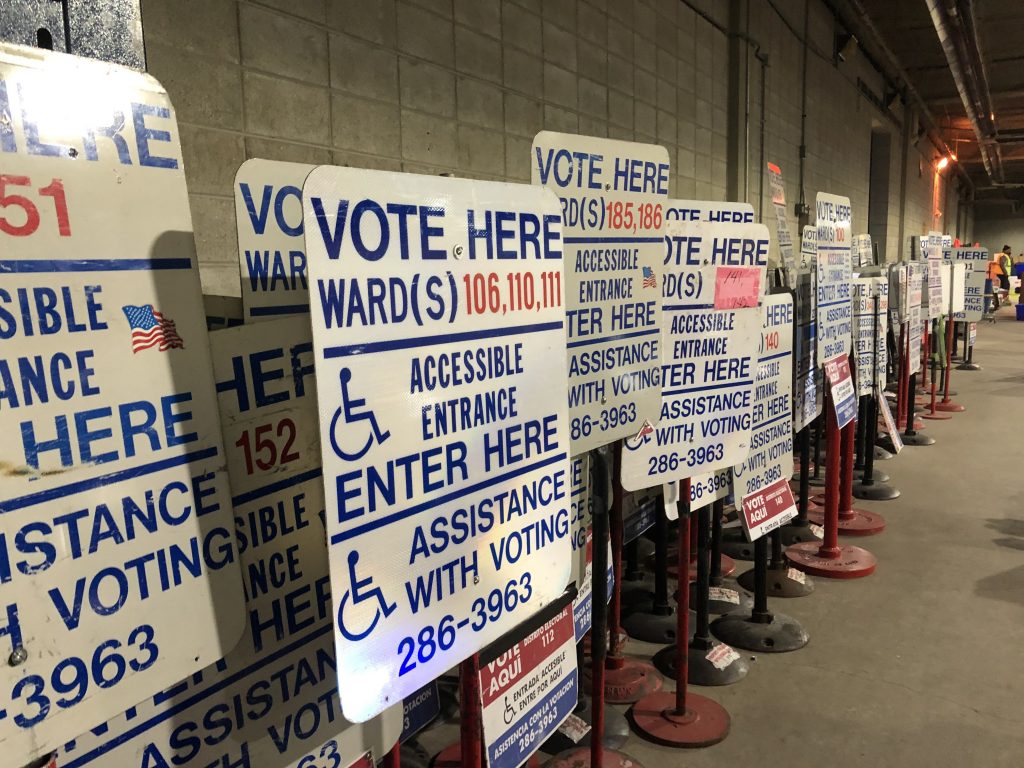Judges Writing New Election Rules
Partisan impasse between governor and Legislature increasingly leaves courts deciding rules.
Once upon a time, Wisconsin governors and legislators decided the rules for the next general election. The Legislature would pass new election-related changes, negotiate any needed compromise, and governors would sign those changes into law.
So much for the civics-textbook lessons of how a bill becomes a law. That requires cooperation between the executive and legislative branches of government. But Democratic Gov. Tony Evers has vetoed every election-law change passed by Republicans who control the Legislature, while GOP legislators declined to take any action after Evers called for a special session on the spring 2020 election.
Lawsuits have resulted in federal and state judges making four major changes in voting procedures:
-On Sept. 7, Waukesha County Circuit Court Judge Michael Aprahamian ruled that local elections clerks can’t fill in – or “cure” – missing information on absentee ballot envelopes. The COVID-19 pandemic caused a 2020 surge in absentee ballots, which require the signature of the voter casting it and the name and address of the witness watching it being filled out. The Elections Commission had advised local clerks that state law gave them authority to fill in some missing information, but the Waukesha County Republican Party sued to overturn that interpretation.
-On Aug. 31, U.S. District Judge James Peterson ruled that voters with disabilities can choose someone to help them return their ballots. The judge said the federal Voting Rights Act supersedes any conflicting state law.
-On July 8, the Wisconsin Supreme Court ruled that ballot “drop boxes” – unmanned secure boxes where thousands of voters dropped off ballots at the height of the pandemic in 2020 – are illegal and cannot be used on Nov. 8. The justices also ruled that voters must drop off their ballots in person, but the federal judge voided that requirement for disabled voters.
-On April 15, the state Supreme Court ordered that a legislative redistricting plan drawn by Republican lawmakers be in place for the Nov. 8 elections. The court split 4-3, with Justice Brian Hagedorn casting the deciding vote. Hagedorn said a U.S. Supreme Court order forced him to accept the Legislature’s “race-neutral” map.
Rick Esenberg, president of the conservative nonprofit Wisconsin Institute for Law & Liberty (WILL) that was in the middle of the fights over election-law changes, said judges corrected the excesses of state officials.
“In fact, the Legislature passed a law that would have permitted this kind of assistance to disabled voters last April,” Esenberg added. “But Governor Evers vetoed it. The only explanation is that he wants third-party ballot collection for all voters. Well, the law doesn’t permit it.”
Jay Heck, executive director of Common Cause in Wisconsin, a non-profit that monitors state government, disagreed. WILL’s lawyers seek “to make it more difficult for disabled voters and voters in general to return absentee ballots either through ballot drop boxes or to have absentee ballots that have a minor witness address incompletion thrown out and not counted and have sought remedy through the courts because of the [Capitol] impasse,” Heck said.
Lawyers like Esenberg “think they can rely on a conservative majority on the Wisconsin Supreme Court or friendly, sympathetic circuit court judges … to do their bidding through court venue ‘shopping’,” Heck added.
Esenberg also said state judges drawing new legislative districts was not surprising. “We always have districts drawn by the courts when we have divided government. Everyone knew that would happen,” Esenberg said. “The only thing that differs from recent Wisconsin history is that it was done by state courts.”
But former Democratic Senate Majority Leader Tim Cullen said the “only fair solution — regardless of which political party is in control — is the Iowa system of redistricting where for over 40 years, non-partisan state employees draw the maps without considering past election results and the Legislature can only vote the maps up or down, but they cannot change or amend them.”
The legal fights continue. Last week, WILL sued in Waukesha County to stop WEC from being part of a federal voter-registration system.
Steven Walters started covering the Capitol in 1988. Contact him at stevenscotwalters@gmail.com
If you think stories like this are important, become a member of Urban Milwaukee and help support real, independent journalism. Plus you get some cool added benefits.
The State of Politics
-
A Wisconsin Political Trivia Quiz
 Dec 15th, 2025 by Steven Walters
Dec 15th, 2025 by Steven Walters
-
The Fight Over Wisconsin’s House Districts
 Dec 8th, 2025 by Steven Walters
Dec 8th, 2025 by Steven Walters
-
The Battle Over On-Line Betting
 Nov 24th, 2025 by Steven Walters
Nov 24th, 2025 by Steven Walters























If “disabled” voters can have somebody else drop off their ballot (but others cannot), what exactly is the legal definition of “disabled”?
Do I need a “handicapped” parking permit, an MCTS reduced-fare card to prove my disability, or will a note from a doctor do? If my wife drops off my ballot, must she show proof of my disability, or might WILL decide later that I voted illegally and throw out my vote (or even prosecute me for voter fraud)?
And in this climate, does anyone trust the judiciary in WI?
Look at the Supreme Court in this state…..they are one rational judge away from the horror that is the US supreme court.
@ kaygeeret – that’s why Republicans keep running to Waukesha County judges; they don’t want impartiality, they just want to get their way.
Maybe if the Legislature didn’t take a 9-month paid vacation every other year despite being paid a full-time salary, things could be addressed. The legislature is proof that some people just don’t want to work anymore.